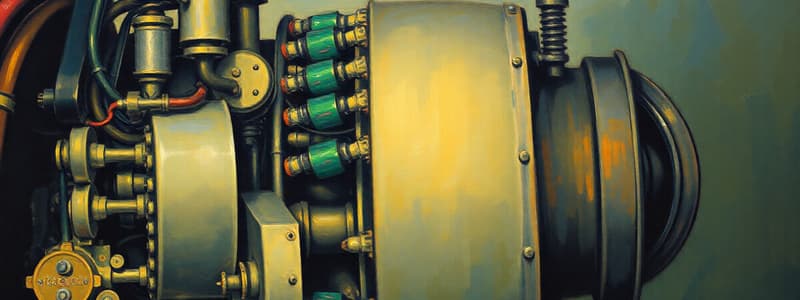Podcast
Questions and Answers
What is the primary function of the fuel return valve (FRV) in the heat management system?
What is the primary function of the fuel return valve (FRV) in the heat management system?
- To regulate the fuel flow to the combustion chamber
- To cool the IDG oil by mixing hot return fuel with cold fuel (correct)
- To increase fuel pressure before injection
- To provide emergency fuel shutoff during overspeed conditions
How does the overspeed protection system function in the context of engine operation?
How does the overspeed protection system function in the context of engine operation?
- It routes all excess fuel directly to the combustion chamber
- It activates the FADEC to control fuel flow during overspeed
- It automatically shuts down the engine when overspeed occurs
- It uses a governor and flywheel to mechanically manage fuel supply (correct)
What initiates the closure of the LP shutoff valve during an emergency shutdown?
What initiates the closure of the LP shutoff valve during an emergency shutdown?
- Manual activation by the pilots via a switch
- High engine temperature detection
- Automatic regulation by the FADEC system
- Pressing the fire push button (correct)
What is the role of the Full Authority Digital Engine Control (FADEC) in the engine system?
What is the role of the Full Authority Digital Engine Control (FADEC) in the engine system?
How is the power supply for each ECU in the FADEC system generated?
How is the power supply for each ECU in the FADEC system generated?
What is the primary function of the fuel metering valve (FMV) in the engine fuel system?
What is the primary function of the fuel metering valve (FMV) in the engine fuel system?
Which component follows the high-pressure (HP) pump in the fuel system to ensure cleanliness of the fuel?
Which component follows the high-pressure (HP) pump in the fuel system to ensure cleanliness of the fuel?
How does the servo fuel contribute to the operation of the engine?
How does the servo fuel contribute to the operation of the engine?
What role does the hydro-mechanical unit (HMU) play in the fuel system?
What role does the hydro-mechanical unit (HMU) play in the fuel system?
What is the purpose of the fuel heat exchanger in the fuel system?
What is the purpose of the fuel heat exchanger in the fuel system?
Flashcards are hidden until you start studying
Study Notes
Fuel System Overview
- Engine fuel system is essential for aircraft operation
- System components are mostly installed on the left side of the fan compartment
- It consists of a primary fuel system connected to the airframe and a secondary fuel system connected to the engine
Main Functions of the Engine Fuel System
- Function One: Provide fuel flow to combustion chamber and sustain combustion for engine thrust.
- This involves fuel flow from the main tanks via the LP pump, heating, filtering, and pressurization by HP pump.
- Metered fuel passes through the FMV to the nozzle and combustion chamber.
- Function Two: Servo fuel (pressurized fuel) actuates compressor airflow control, turbine clearance control, and the FMV.
- Servo fuel passes through a wash screen filter and servo fuel heater to remove ice particles.
- Servo fuel drives the actuators (TBV, VSV, VBV, LPTACC, HPTACC) controlled by the ECU.
- Function Three: Heat Management
- Engine oil is cooled using the oil/fuel heat exchanger.
- Integrated drive generator (IDG) oil is cooled using the IDG cooler
- Bypass valve in the Hydro Mechanical Unit (HMU) redirects servo fuel to cool IDG oil.
- Fuel return valve (FRV) is controlled by the ECU and uses servo fuel to mix hot return fuel with cold fuel to reduce thermal stress.
Engine Protection
- Overspeed Protection:
- Mechanically controlled by governor, flywheel, and bypass valve.
- Independent of FADEC.
- Bypasses fuel to reduce fuel flow in case of increased speed.
- FADEC receives a signal if N2 exceeds 45%.
- Emergency Shutdown:
- Fire push button closes the LP shutoff valve to shut down the engine.
- High Pressure Shut Off Valve:
- Supplied by pilots and controlled by pressure, it shuts off fuel to the combustion chamber.
- Normal Shutdown:
- The engine master switch turns off the LP and HP fuel shutoff valves and FRV.
- ECU drives the FRV to close.
FADEC System
- Full Authority Digital Engine Control (FADEC): Regulates and schedules engine systems for thrust control and engine optimization.
- Interfaces with aircraft signals.
- FADEC System:
- Consists of two channels of electronic control units (ECUs) per engine.
- ECU is the FADEC computer, located on the engine fan case.
- Power Supply:
- ECUs are powered by a three-phase permanent magnet alternator when N2 > 15%.
- The FADEC control alternator provides independent power to both ECU channels.
FADEC System Functions
- Power management control
- Variable Bleed Valves (VBVs) control
- Other Components
- Hydro Mechanical Unit (HMU)
- Fuel Control Unit (FCU)
- Fuel metering valve (FMV)
- LP pump
- HP pump
- Oil/fuel heat exchanger
Studying That Suits You
Use AI to generate personalized quizzes and flashcards to suit your learning preferences.




